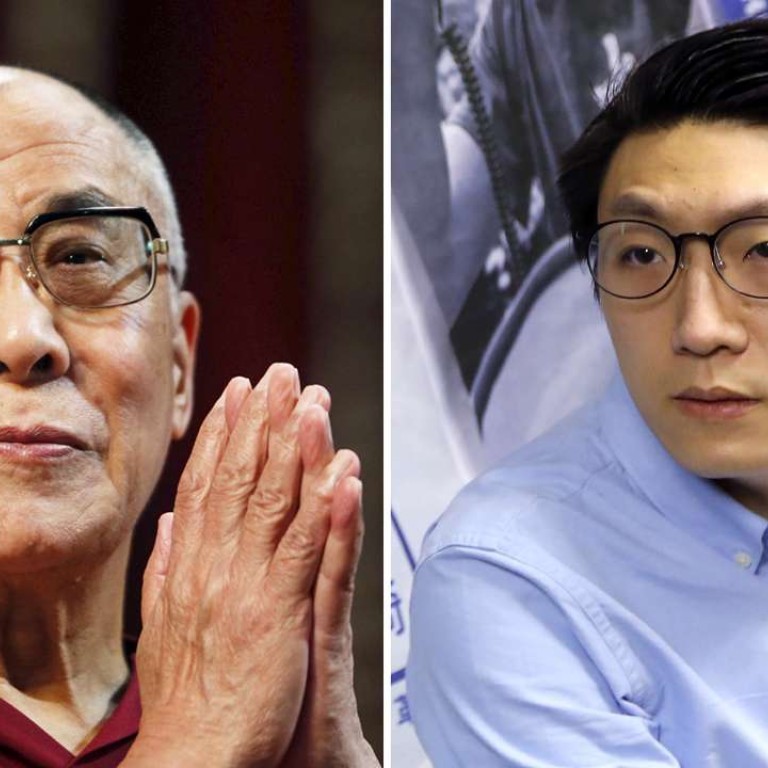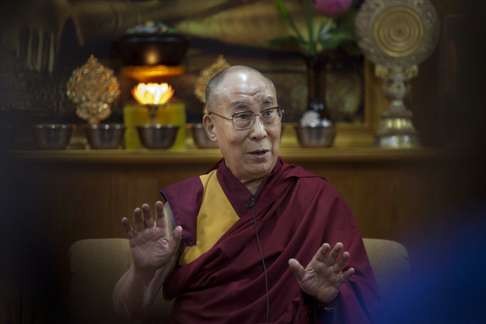
Dalai Lama urges Hong Kong not to quit democracy fight, says pro-independence activist after visit
But at conference with spiritual leader, Hong Kong Indigenous member concedes mainland activists sceptical of city splitting from China
The Dalai Lama has called on Hongkongers not to give up the fight for democracy, according to Hong Kong Indigenous member Edward Leung Tin-kei who met with the Tibetan spiritual leader in India along with 60 others from the mainland, Macau, Taiwan, Europe and the United States.
Leung, who returned to Hong Kong from India on Tuesday, said the Dalai Lama described many mainland activists who fled abroad following the 1989 Tiananmen crackdown as becoming discouraged over time.
“His main message was Hongkongers need to be determined and maintain their passion,” Leung said.
The group aimed to advance “a peaceful transition to democracy in China through truth, understanding, citizen power, and cooperative action”, according to its Facebook page.
Leung said he was “inspired” by his meeting with Tibetan activists, who shared their stories of how they fled Tibet.
The Hong Kong Indigenous member, who previously stated his group had no boundaries in its protest methods, said the Tibetan activists tried to persuade him to adopt non-violent means.

“Even though our approaches are different… the discussion was very rational,” he said. “This is very different from [the debate] in Hong Kong … which is very polarised.”
Leung, however, did not say whether his views on non-violent protests had changed, only stating that the method to be adopted depended on circumstances.
The Hong Kong Indigenous member said he spoke to others at the conference on the importance of the city becoming independent.
However, Leung said pro-democracy activists from the mainland were sceptical towards the suggestion that Hong Kong be split from China.
He said the activists questioned whether other Chinese people would accept an independent Hong Kong and that they asked whether he thought advocating for independence would play into the hands of the Chinese Communist Party.
Meanwhile, former security minister Ambrose Lee Siu-kwong said on a DBC radio show on Thursday that pro-independence rhetoric only served to destroy mutual trust between Hong Kong and the central government.
Lee also criticised members of the pan-democratic camp for expressing “overt” support for independence, which he said was a ploy for them to capture both radical and moderate votes.
“They have political considerations and want to win both sides. This to me is a very dangerous tactic.”

Rita Fan Hsu Lai-tai, a member of the National People’s Congress Standing Committee and former Legislative Council president, said attempts to promote independence had caused mainlanders to become “apathetic” towards Hong Kong.
“The country as we all know already faces a lot of national security problems, internationally and internally … and now Hongkongers want independence,” Fan said.
“The mere mention of this has made many of our mainland compatriots highly apathetic towards people in Hong Kong.”
Fan said the establishment of pro-independence political parties would only heighten Beijing’s concerns over national security.
Additional reporting by Ernest Kao


